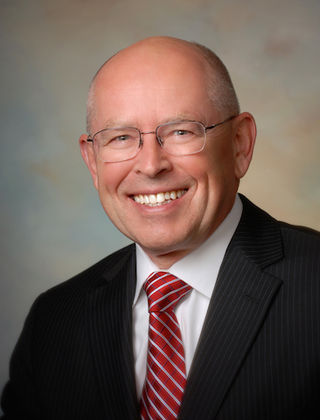
From the earliest days of the Christian faith, Christians have viewed marriage as a divinely blessed, lifelong, monogamous union between a man and a woman. However, while many Christians might agree with the traditional definition, the terminology and theological views of marriage have varied through time in different countries, and among Christian denominations.

Wayne A. Grudem is a New Testament scholar turned theologian, seminary professor, and author. He co-founded the Council on Biblical Manhood and Womanhood and served as the general editor of the ESV Study Bible.

James Innell Packer was an English-born Canadian evangelical theologian, cleric and writer in the low-church Anglican and Calvinist traditions. He was considered one of the most influential evangelicals in North America, known for his best-selling book Knowing God, written in 1973, as well as his work as an editor for the English Standard Version of the Bible. He was one of the high-profile signers on the 1978 Chicago Statement on Biblical Inerrancy, a member on the advisory board of the Council on Biblical Manhood and Womanhood, and also was involved in the ecumenical book Evangelicals and Catholics Together in 1994. His last teaching position was as the board of governors' Professor of Theology at Regent College in Vancouver, British Columbia, in which he served from 1996 until his retirement in 2016 due to failing eyesight.

The Council on Biblical Manhood and Womanhood (CBMW) is an evangelical Christian organization promoting a complementarian view of gender issues. According to its website, the "mission of The Council on Biblical Manhood and Womanhood is to set forth the teachings of the Bible about the complementary differences between men and women, created equally in the image of God, because these teachings are essential for obedience to Scripture and for the health of the family and the church." CBMW's current president is Dr. Denny Burk, a professor of biblical studies at Boyce College and director for The Center for Gospel and Culture at The Southern Baptist Theological Seminary. Its 2017 "Nashville Statement" was criticized by egalitarian Christians and LGBT campaigners, as well as by several conservative religious figures.

Complementarianism is a theological view in some denominations of Christianity, Rabbinic Judaism, and Islam, that men and women have different but complementary roles and responsibilities in marriage, family life, and religious leadership. Complementary and its cognates are currently used to denote this view. Some Christians interpret the Bible as prescribing complementarianism, and therefore adhere to gender-specific roles that preclude women from specific functions of ministry within the community. Though women may be precluded from certain roles and ministries, they are held to be equal in moral value and of equal status. The phrase used to describe this is "ontologically equal, functionally different".
Christian feminism is a school of Christian theology which uses the viewpoint of a Christian to promote and understand morally, socially, and spiritually the equality of men and women. Christian theologists argue that contributions by women and acknowledging women's value are necessary for a complete understanding of Christianity. Christian feminists are driven by the belief that God does not discriminate on the basis of biologically-determined characteristics such as sex and race, but created all humans to exist in harmony and equality regardless of those factors. On the other hand, Christian egalitarianism is used for those advocating gender equality and equity among Christians but do not wish to associate themselves with the feminist movement.

Christian egalitarianism, also known as biblical equality. Christian egalitarians believe that the Bible advocates for gender equality and often allows women to be apart of the clergy. In contrast to other views such as complementarianisim and Christian patriarchy Egalitarians believe in a form of mutual submission in which all people submit to each other in relationships and institutions as a code of conduct without a need for hierarchical authority.

The roles of women in Christianity have varied since its founding. Women have played important roles in Christianity especially in marriage and in formal ministry positions within certain Christian denominations, and parachurch organizations. In 2016, it was estimated that 52–53 percent of the world's Christian population aged 20 years and over was female, with this figure falling to 51.6 percent in 2020. The Pew Research Center studied the effects of gender on religiosity throughout the world, finding that Christian women in 53 countries are generally more religious than Christian men, while Christians of both genders in African countries are equally likely to regularly attend services.

The Evangelical and Ecumenical Women's Caucus (EEWC), also known as Christian Feminism Today (CFT), is a group of evangelical Christian feminists founded in 1974. It was originally named the Evangelical Women's Caucus (EWC) because it began as a caucus within Evangelicals for Social Action, which had issued the "Chicago Declaration". Its mission is to "support, educate, and celebrate Christian feminists from many traditions." It favored passage of the Equal Rights Amendment, encourages the ordination of women, and has called for gender-inclusive language in all communications. The word ecumenical was added to the organization's name in 1990 in order "to reflect the increasingly inclusive nature and the many traditions of [the organization's] membership".

Recovering Biblical Manhood and Womanhood: A Response to Evangelical Feminism is a collection of articles on gender roles, written from an evangelical perspective, and edited by John Piper and Wayne Grudem. Crossway Books published the book in 1991 for the Council on Biblical Manhood and Womanhood (CBMW). CBMW, an international interdenominational evangelical Christian organisation, has a board and staff committed to a view of gender roles they dub complementarian. Recovering Biblical Manhood and Womanhood won Christianity Today's Book of the Year award in 1992.
The Danvers Statement is a statement of the complementarian Christian view of gender roles. It is not the product of any particular Christian denomination, but has been cited by the Southwestern Baptist Seminary, the Presbyterian Church in America, and the International Council for Gender Studies. It was first published by the Council on Biblical Manhood and Womanhood (CBMW) in Wheaton, Illinois in November 1988. Work on the statement began with "several evangelical leaders" at a CBMW meeting in Danvers, Massachusetts in December 1987. In 1989, a paid advertisement center-spread appeared in the January 13 issue of Christianity Today accompanied with the Danvers Statement.

1 Timothy 2:12 is the twelfth verse of the second chapter of the First Epistle to Timothy. It is often quoted using the King James Version translation:
But I suffer not a woman to teach, nor to usurp authority over the man, but to be in silence.

Biblical patriarchy, also known as Christian patriarchy, is a set of beliefs in Evangelical Protestant Christianity concerning gender relations and their manifestations in institutions, including marriage, the family, and the home. It sees the father as the head of the home, responsible for the conduct of his family. Notable people associated with biblical patriarchy include Douglas Wilson, R. C. Sproul, Jr., Voddie Baucham, the Duggar family, and Douglas Phillips.
Jack Cottrell was a Christian theologian, philosopher and author in the Christian churches and churches of Christ. He was a professor of theology at Cincinnati Christian University from 1967 to 2015. He authored many books on Christian philosophy, doctrine and theology.
Catherine Clark Kroeger was an American writer, professor, New Testament scholar, and a leading figure within the biblical egalitarian movement. She founded the worldwide organization Christians for Biblical Equality (CBE), and its papers are housed at her family home. As a speaker, Kroeger traveled the globe opposing violence and the abuse of women, while also advancing the biblical basis for the shared leadership and authority of males and females.

Biblical womanhood is a movement within evangelical Christianity, particularly in the United States. It adopts a complementarian or patriarchal view of gender roles, and emphasizes passages such as Titus 2 in describing what Christian women should be like. According to Rachel Held Evans, it is driven by the conviction that "the virtuous woman serves primarily from the home as a submissive wife, diligent homemaker, and loving mother."
kephalē appears some 75 times in the Greek New Testament. It is of considerable interest today because of differences of biblical interpretation between Christian egalitarians and Complementarians as to the intent of the New Testament concerning roles of authority assigned biblically to husbands and wives. A prime example appears in Ephesians 5:21–24 where all Christians are told:
Kevin N. Giles is an Australian evangelical Anglican priest and theologian who was in parish ministry for over 40 years. He and his family live in Melbourne, Australia. Giles studied at Moore Theological College in Sydney, Durham University, England and Tubingen University, Germany. He has a Doctor of Theology degree from the Australian College of Theology.
The Nashville Statement is an evangelical Christian statement of faith relating to human sexuality and gender roles authored by the Council on Biblical Manhood and Womanhood (CBMW) in Nashville, Tennessee. The Statement expresses support for marriage between one man and one woman, for faithfulness within marriage, for chastity outside marriage, and for a link between biological sex and "self-conception as male and female". The Statement sets forth the signatories' opposition to LGBT sexuality, same-sex marriage, polygamy, polyamory, adultery, and fornication. It was criticized by egalitarian Christians and LGBT activists, and several conservative religious figures.

The Making of Biblical Womanhood: How the Subjugation of Women Became Gospel Truth is a book written by Beth Allison Barr and published in 2021 by Brazos Press, a division of Baker Publishing Group. The book discusses women in Christianity and argues that the restrictive position known as complementarianism is a recent development inconsistent with the historic roles of women in the church.







